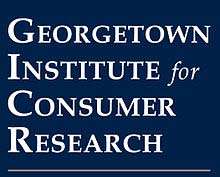Georgetown Institute for Consumer Research
 The Georgetown Institute for Consumer Research logo | |
| Type | Academic institute |
|---|---|
| Established | 2012 |
Parent institution |
McDonough School of Business Georgetown University |
| Director | Dr. Kurt Carlson |
| Location | Washington, D.C. |
| Website |
consumerresearch |
The Georgetown Institute for Consumer Research (GICR) is an academic institute within the McDonough School of Business at Georgetown University that was founded in 2012.[1] GICR regularly conducts and disseminates experimental and observational research on which consumers are the focus of analysis. GICR seeks to produce insights about consumers to help both consumers and practitioners make better decisions. The current director is Dr. Kurt Carlson.[2]
Background
McDonough School of Business,[3] home of the institute, is part of Georgetown University, founded in Washington, D.C. in 1789. The institute shares the university’s mission to produce knowledge and educate leaders to address the most significant challenges and opportunities facing business and society. Other centers and initiatives that the McDonough School of Business supports include, but are not limited to, the Center for Business & Public Policy, Center for Financial Markets and Policy, Real Estate Finance Initiative, Entrepreneurship Initiative, Global Business Initiative, Global Social Enterprise Initiative, Women's Leadership Initiative, and the Institute for the Study of Markets and Ethics.[4]
Research outputs
Consumer Problem Survey (CPS)
On a monthly basis the Georgetown Institute for Consumer Research (GICR) asks consumers what problems they have and how they intend to use the market to help solve those problems. The findings from this survey are intermittently compiled into a report on consumer behaviors.[5][6] The GICR CPS is the only survey of its kind, focusing not on consumer behavior or sentiment, but on the problems that drive consumers to the marketplace to seek solutions. This focus stems from the critical role that problem recognition plays in determining when and how consumers will enter the market as prospective buyers in the buying decision process. It tracks over 250 common consumer problem types organized into 30 plus subcategories and nine major categories (e.g., Finance, Health, Social, Communication, Transportation, Personal Care, Attire, Work-Life, and Home-Housing). By measuring and tracking the problems that trigger consumers to enter the marketplace in search of solutions, the CPS provides entirely new insights into how consumers’ problems change seasonally and annually. The data from the CPS correlates with Census data on consumer spending.
Problem-Driven Consumption Index (PDCI)
Data from the CPS survey is used to generate and publish a monthly index referred to as the Problem-Driven Consumption Index (PDCI). The PDCI is a measure of consumers’ future spending, based on the number of problems they have, their likelihood to solve those problems, and consumers' capacity to solve problems.
The PDCI is composed of three components: the quantity of consumer problems, consumers likelihood to solve problems, and consumers expected spending to solve problems. Each component reflects algorithms used to compile the monthly survey data. In addition to the overall PDCI, analyses are conducted for nine different categories of problems (e.g., finance, health, housing, transportation).
Reports
GICR spending occasion reports are frequently cited in the media. They offer a valuable resource for reporters and marketers who are looking to better understand consumer intentions for an upcoming event or holiday, such as Black Friday, Valentine's Day, or any other consumer-rich time.[7][8][9]
Research briefs
Research briefs contain a short summary of a finding from a study on consumer behavior.[10] Research Briefs focus on new and relevant findings revolving around consumer behavior, such as the efficacy of specific advertisements,[11] differences between consumers,[12] segmentation,[13]
Polls
GICR also produces polls that represent a snapshot of a timely, provocative, and novel consumer-related issue.
Executive Committee & affiliated individuals
Director
The Director of GICR is Professor of Marketing at McDonough School of Business, Kurt A. Carlson.[14] Prior to joining Georgetown, Carlson was on the faculty of the Fuqua School of business at Duke University from 2001-2009. Carlson has published extensively on the topic of the development of consumer preferences and the influence of the product formation process on decision making. Though much of his research explores consumer decision making, he also studies how voters, jurors, and managers make decisions. His research has been published in top marketing, psychology, and management journals.[15] He has also published a book entitled, Contemporary Brand Management.[16]
Executive Board
The GICR Executive Board consists of David Thomas, Dean of the McDonough School of Business, Luc Wathieu, Deputy Dean and Professor of Marketing at the McDonough School of Business.
Staff & affiliated faculty
Other GICR staff include: Research Director, Christopher Hydock, Assistant Director of Project Administration & Finance, Anab Garad, and Research Associates Iris Wang and Anne Wilson[17] Affiliated Georgetown University Faculty include: Marlene Morris Towns, Vishal Agrawal, Alan Andreasen, Simon Blanchard, Karthikeya Easwar, Ronald Goodstein, Prashant Malaviya, Neeru Paharia, Sunita Sah, Robert J. Thomas, and Debora Thompson.[18]
References
- ↑ "Facts about Georgetown McDonough". Georgetown University.
- ↑ "Executive Board". Georgetown Institute for Consumer Research.
- ↑ "Georgetown University McDonough School of Business". Georgetown University McDonough School of Business. The Princeton Review. Retrieved 10 March 2014.
- ↑ "McDonough School of Business". Georgetown University. Retrieved 11 March 2014.
- ↑ Carlson, Kurt. "Q4 2013 CONSUMER PROBLEM SURVEY REPORT" (PDF). Georgetown Institute for Consumer Research. Retrieved 11 March 2014.
- ↑ "All CPS & GUPI Reports". Georgetown Institute for Consumer Research. Retrieved 11 March 2014.
- ↑ "Shoppers Will Spend 50 Percent Of Their Holiday Budget During Thanksgiving Sales This Year". PR Newswire. Retrieved 11 March 2014.
- ↑ Dusto, Amy. "Thanksgiving shoppers will spend half their holiday budgets next week". Internet Retailer. Retrieved 11 March 2014.
- ↑ Lansing. "Survey: Shoppers To Spend Half Of Holiday Budgets This Weekend". CBS Detroit.
- ↑ "Institute Findings". Georgetown Institute for Consumer Research. Retrieved 11 March 2014.
- ↑ Hydock, Chris. "Super Bowl Advertising: Lots of Buzz… But is it Worth it?" (PDF). Georgetown Institute for Consumer Research. Retrieved 11 March 2014.
- ↑ "Understanding the Difference Between Frequent Buyers and Fiercely Loyal Consumers" (PDF). Georgetown Institute for Consumer Research. Retrieved 11 March 2014.
- ↑ "Get the Segmentation Basis Right and Consumers Will Divulge" (PDF). Georgetown Institute for Consumer Research. Retrieved 11 March 2014.
- ↑ "Kurt Carlson". Georgetown University. Retrieved 11 March 2014.
- ↑ "Kurt Carlson, Publications". Georgetown University. Retrieved 11 March 2014.
- ↑ "Contemporary Brand Management". Retrieved 11 March 2014.
- ↑ "Staff". Georgetown Institute for Consumer Research. Retrieved 11 March 2014.
- ↑ "Affiliated Faculty". Georgetown Institute for Consumer Research. Retrieved 11 March 2014.
